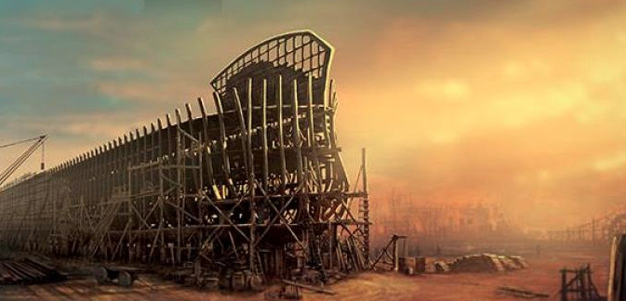Cultural Christianity

Three weeks into its run at the box office, the movie Noah continues to satiate America’s curiosity about the Great Flood of Genesis and the co-existing complexities of creation, judgment, and God’s mercy. Despite its deliberate historical misrepresentation, the movie’s storyline stirs up an innate curiosity to investigate the Biblical version for comparison.
After all, we owe it to ourselves to discern between a great movie and a great story that is everlasting and true. It’s a perfect cocktail conversation, and its timing seems relevant.
However, our pop culture is a fickle one. Our romance with the blockbuster movie already is diminishing as we flock like lost sheep to pursue a comic book storyline about a different hero with a military rank and protective shield. Noah dropped to number five in the top box office rankings after its third week in theaters. Although it prompted us to investigate the original story of Noah, did we fail ourselves — and possibly our children — for not reading the Biblical account to compare it with the movie’s screenplay? What will be this generation’s memory of real truth?
We are thriving in an entertainment economy where truth sometimes loses out to fiction and special effects. Our proclivity to be at the latest movie release, the newest restaurant or art exhibit demonstrates our inability to focus long enough to determine the real value of it all and its proper place in our existence today and in eternity. This truth about our culture fans the flames of success in Hollywood. This reality has not escaped the post-modern church either, and Easter Sunday will be the tell.
On this day, Christians across the globe will swarm to a different kind of theater — the sanctuary, the worship center, the hipster back room coffee shop, the revamped gymnasium — to appease their appetite for salvation and eternal life. No one wants to be part of the crowd locked outside the ark; not on this day. Today, for many, church is the place to see and be seen.
On this day Christians declare in unison our faith in a storyline that no motion picture with computer-generated imagery can come close to capturing. Yet many churches today will do their best to incorporate similar effects, creating experiential worship services that border on entertainment —in hopes that the overflowing crowds will return and the blockbuster story of salvation keeps church at the top of the charts, at least for a season. Our pop culture loves a good show, and a Sunday morning church experience can be entertaining.
More than 2,000 years ago, a Jewish culture swarmed to an outdoor theater called Golgatha, and the entertainment of the day was a crucifixion. The starring role featured Jesus Christ, the Son of God. The finale three days after His death was so stirring that it continues rippling today through our pop culture.
It’s a tsunami storyline of judgment, mercy, and salvation that promises to reach the ends of the earth, but without flooding it. The ripples of truth about Easter are from different waters than those that lifted the ark. Now death to all mankind falls on a single Lamb. The merciful substitution atones for the mistakes of us all and takes on a single horrific death that even Mel Gibson could not convey completely. Victory over death is the finale that Christians cling to, especially on Easter.
As part of our Christian culture and the expression of it to a new generation, it seems we owe it to ourselves to read the Biblical story of the resurrection, embrace it, and declare, “He has risen!” But why just today? It’s a proclamation that deserves an encore and our presence every Sunday.
